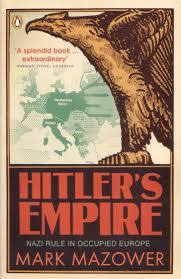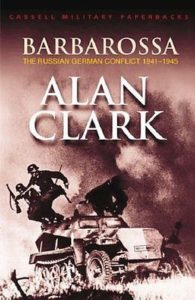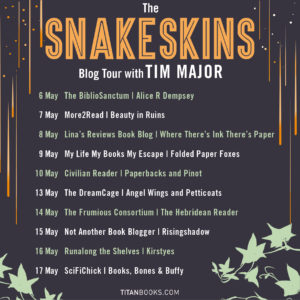 Q. Every book has its own story about how it came to be conceived and written as it did. How did Snakeskins evolve?
Q. Every book has its own story about how it came to be conceived and written as it did. How did Snakeskins evolve?
A. As far back as 2015 I wrote the idea in my notebook, after learning that during a seven-year period, every cell in the human body is replaced. I loved the idea that instead of happening gradually, this process might occur at a single moment – and that the old skin would be shed like a snake’s skin. I’m pretty sure that the additional complication was included in that original idea – that the Snakeskin would be alive, and sentient. I wrote a short story about a teenage girl experiencing her first shedding. It was pretty good, I think, but I was immediately aware that I wasn’t doing the idea justice – and that there was a novel’s worth of extra material to explore. The teenage girl remained my central storyline, but I also decided to imagine the effect of this miraculous power on the members of society who didn’t have the ability to shed their skins and rejuvenate in the process. Teenager Caitlin’s story is primarily about her grappling with her identity, but a lot of the novel is also concerned with the idea of privilege, and unequal societies.
Q. I loved the many dense contemporary topics that Snakeskins grapples with: from themes of identity and humanity to the costs of isolationism and the centralization of political power. Which real-world social and political issues did you have in mind when you were writing this novel, if any?
A. Ha! I should have read the questions before I started answering them, because in my last answer I was reaching for the same concept that you’ve stated very eloquently. As I say, the idea of grappling with your identity was the starting point. I have a particular irrational fear – though I think it’s very similar to a fear most people have. The fear is that somebody else might do a better job of being me. Is that really weird? Partly, it’s about my anxiety about not using all of the opportunities I’ve been given and the potential I may have, but it’s also a worry about not living life to the full. I’ve always been fascinated by doppelgänger stories, and I think the idea of facing an exact duplicate of oneself is horrific – but what if that person also shared all of your memories and talents? How would you decide who was the more valid human?
As for the societal issues… I wrote the first draft of the novel before the EU referendum which kickstarted the Brexit process – but while Brexit wasn’t a starting point for the idea of an isolated Britain, you can be sure that the tone of politics in the UK fed into later drafts of the novel. Trump, too, of course – his brand of nationalism and isolationism was an almost equal influence. I don’t think it’s too controversial, or too much of a spoiler, to say that I’m not a fan of either Trump or Brexit. In Snakeskins, Britain’s response to families being gifted Charmer powers is to cut itself off from the rest of the world to protect its special status, and the Great British Prosperity Party ends up running the country for generations – its corruption provides the novel with its political-thriller plotline.
Q. Do you write with any particular audience in mind? Are there any particular audiences you hope will connect with this story?
A. It’s a tricky novel to define absolutely in genre terms. While I consider Snakeskins to be a speculative novel, the process of sheddings might as well be magic, given that none of the characters understand it to any degree – so I suppose weird fiction, or even urban fantasy would be appropriate enough labels… There are three point of view characters, but undoubtedly the central one is a 17-year-old girl, whose storyline is essentially about determining her character as she enters adulthood, so I’d understand if people felt there was a YA element to the book too.
Good grief, that’s a woolly answer, isn’t it? The book is a strange beast. If I’m honest, I’m hopeful that there are no particular audiences who will find any obstacles to enjoying the novel.
Q. I very much enjoyed following Caitlin Hext’s journey, chuckling aloud at your line “Caitlin only had herself to blame for being so insufferable.” A lot of your long-form fiction has to do with teenagers or other people on the cusp of maturity being forced to grow up. It could be argued that the Britain of Snakeskins is being forced to grow up, too. Is this a topic you’re drawn to, and why do you think that is, if so?
A. That’s a good point. My previous book, Machineries of Mercy, was a YA novel, about young offenders being imprisoned in a virtual reality world designed to appear like a quaint English village – so there was always going to be a coming-of-age element to that. But you’re right – my first novella, Carus & Mitch, is about a teen girl and her younger sister living in total isolation, and Blighters is about an adult woman who behaves like a teen and who is forced to mature (then again, it’s also about giant alien slugs). I started writing when my wife and I were expecting our first child, so perhaps because of that timing a lot of my work relates to families – and I think it’s fair to say that children becoming adults is one of the big crisis moments in any family.
The idea that Britain itself is being forced to grow up is very interesting! I’ll have to go away and have a think about that, but I’m sure you’re onto something. The Britain of Snakeskins has lost in way in terms of openness and inclusion – issues that certainly apply to the real world too. So if Britain in the novel is on the cusp of growing up, it’d be nice to think that Britain in the real world might be about to do so, too.
Q. What is the first book you read that made you think, “I have got to write something like this someday!” If I guessed John Wyndham’s Day Of The Triffids would I be very far off?
A. Impressive! You wouldn’t be far off at all. The Day of the Triffids was my gateway to adult SF, and the biggest influence on the type of SF I write (high-concept, very British, cosy catastrophes). But I had the ambition of being a writer before that point. When I was about seven years old my mum won an electronic typewriter in a short story competition. She lent it to me, and I would write my own stories, but more often I would simply type out my favourite stories from published books – I was in love with the act of writing before I even had big ideas for my own stories. But in particular, it was reading and collecting classic-series Doctor Who novelisations that turned me from a reader to a bibliophile, and I remember announcing that one day I’d write a Doctor Who novel of my own. It hasn’t happened yet, though!
Q. How did you learn to write?
A. In 2012 I heard about NaNoWriMo, the internet community in which people try to write a 50,000-word draft of a novel during the month of November. I was eager to have a go – writing a novel was my specific ambition, rather than publishing one, so this seemed a good way of blasting through and ticking the task off my list – but I couldn’t wait, so I did it alone in February of that year. It wasn’t a good novel at all. I had another try in November of the same year. Still not a good novel, but I honestly didn’t mind, because I was learning a huge amount about the business of writing – things I’d never even considered as a reader, such as how to identify viewpoint characters, where to ‘point the camera’, how to condense dull-but-necessary sequences and alter pacing to emphasise action or suspense…
Q. Do you adhere to any particular writing regimen? Does your work as an editor help or hinder your own creative process?
A. I don’t have any particular regimen in any sense. I have two young sons (aged 2 and 5) and while they now usually sleep through the night, so I have my brain back a little, my life is still geared around their needs, and my wife and I share childcare duties. So I work part-time, and my writing has to be carved out of that time. Generally, I manage about 10 hours per week, but I rarely manage to write every day. I don’t think it’s as important as some people make out.
I love my day-job work as an editor but I’m not sure it feeds into my own writing, although the fact that I’m freelance means that I can switch between writing and work very easily, as I remain sitting at the same desk in both cases! Far more important is what I read for pleasure, which has a big influence on whatever I’m writing at that point.
Q. Are you a pantser (someone who writes by the seat of their pants) or a plotter?
A. A plotter, and more and more so. I was fairly freeform in my early novels, but all that really meant is that I plotted in detail during later drafts. I seem to remember that my first published novel went through eight drafts. Nowadays I write very detailed synopses, scene by scene. I feel perfectly able to veer away from the plan when I’m writing, though!
Q. What can you tell us about your next project?
A. In terms of publications, the next book will be And the House Lights Dim, my first short story collection, which will be published in July 2019. I’ve just delivered the manuscript of my next novel to Titan Books, which is due to be published in May 2020. It’s called Hope Island, and it features a remote island, creepy children, a cavern full of ethereal song, and dead bodies. Quite a lot of dead bodies. Also, I’ve just put the finishing touches to an SF novella, a detective story set on Mars. I’m very excited about my next next novel, which is shaping up to be bigger and weirder than any so far.
Q. What are you reading at the moment?
A. I’ve just finished Stuart Turton’s The Seven Deaths of Evelyn Hardcastle, which I’d been meaning to read for ages, and which was selected by an SF book club of which I’m a member. This morning I started reading We by Yevgeny Zamyatin, the 1924 Russian dystopian novel which was the precursor to Brave New World and 1984.
Q. Are there any new books or authors in weird fiction that have you excited?
A. Yes! Helen Marshall’s recent novel The Migration is, I think, close to perfect. Aliya Whiteley’s The Beauty and The Arrival of Missives are two of my favourite modern novellas. Naomi Booth’s Sealed is horrific and compelling. Tade Thompson’s The Murders of Molly Southbourne is punchy and has an amazing central concept. Malcolm Devlin’s collection You Will Grow Into Them and Marian Womack’s collection Lost Objects are both subtle and sharp. All of the authors with stories in Dan Coxon’s anthology This Dreaming Isle are terrific.
Q. What made you choose weird fiction as your primary means of expression?
A. I suppose you’re right that weird fiction is my primary means of expression – even though Snakeskins is touted as an SF thriller, there’s definitely weirdness at its heart. My short stories are mostly very weird. I guess I feel that weirdness is a valid way to explore the world, or at least the way I experience the world. Families are weird, when you look at them close enough. Society is weird. Life is weird.
Q. Tell us why you love your book!
A. Oh! I tell you what, at this moment I feel like the book is a child I need to protect, now that it’s suddenly thrust out into the world. So when I think about what I love about it, I feel immediately defensive! Let me take a breath before I answer… I love the characters, first and foremost – I wish I were as headstrong as Caitlin, as dogged as Gerry, as capable of change as Russell – though part of their appeal is that they’re all terribly flawed, and I’ve always rooted for underdogs. I love the two Hext family shedding sequences, the strangeness combined with family bickering – they stick in my mind even though I haven’t read the novel myself for a while. More than anything, I think I like the tone of the novel and the dialogue. I’ve always intended to write about big ideas in a down-to-earth manner, and I think Snakeskins achieves that. I’m proud of it, I really am.
~~~
Tim Major’s love of speculative fiction is the product of a childhood diet of classic Doctor Who episodes and an early encounter with Triffids. Tim’s novel about spontaneous clones, Snakeskins, was published by Titan Books in May 2019, with a short story collection, And the House Lights Dim, to follow. Previous books include Machineries of Mercy, You Don’t Belong Here and a non-fiction book about the 1915 silent crime film, Les Vampires. His short stories have appeared in Interzone and Shoreline of Infinity and have been selected for Best of British Science Fiction and The Best Horror of the Year.
Visit his website at Cosy Catastrophes.
Doreen’s review of Snakeskins may be found here.
~~~





